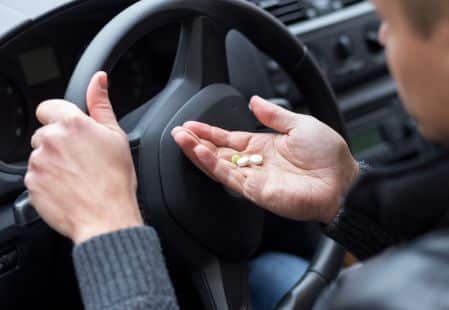Everyone knows how dangerous driving after drinking alcohol can be, but despite this, people still do it every day. The National Highway Traffic Safety Administration says that 32% of all fatal car crashes in the U.S. involve a drunk driver!
What is less talked about is drugged driving. Drivers under the influence of drugs are impaired drivers, and depending on what drugs they took and their effects, they can be even more dangerous than drunk drivers.
According to the 2018 National Survey on Drug Use and Health, 20.5 million people drove while under the influence of drugs at least once that year, and the Governors Highway Safety Association found that 43.6% of fatally injured drivers were under the influence of at least one drug, and often two or more, at the time of their crashes.
Even so-called “harmless” drugs are dangerous when you get behind the wheel of a car.
Recreational marijuana is illegal in Georgia, as well as in all of its bordering states, as of January 2023, but it is still one of the most commonly used illicit drugs in the state. Like drunk drivers, drivers under the influence of marijuana suffer from slowed reaction time, impaired judgment, and poor motor coordination, making crashes more likely.
Most Common Illegal Drugs involved in Auto Wrecks
While alcohol is the most common cause of impaired driving, marijuana is a close second. Commonly abused drugs that can lead to car crashes include:
- Marijuana
- Opiates
- Methamphetamine
- Heroin
- Cocaine
- Hallucinogens
How To Prove Illegal Drugs Were at Play
If the responding police officer suspects that one of the drivers involved in the wreck was under the influence of drugs, they can order that driver to submit to a drug test. While drug tests are generally reliable at showing whether the driver took drugs, they are less reliable at proving whether the driver was actually under the influence at the time of the crash.
For example, the effects of marijuana generally only last one to three hours, but the drug can remain in the body for days or even weeks. That means a driver may have smoked on Saturday, but was completely sober when they got into a crash on Wednesday, despite testing positive for marijuana on the drug test.
However, a positive drug test can still be a powerful piece of evidence, especially in combination with other evidence, such as:
- A criminal history of drug use/possession, especially prior drug-related DUI charges
- Drugs or drug paraphernalia found in the car at the time of the crash
- Witness statements or video evidence of the driver acting noticeably impaired at the time of the crash
It is often not possible to get this type of evidence for use in your insurance claim, such as the results of any drug test conducted by the police, without filing a lawsuit.
Most Common Prescription Drugs Involved in Auto Wrecks
Even legal drugs can impair driving. If a prescription or over-the-counter drug contains the warning “do not operate heavy machinery,” this includes driving a car while the drug is in effect.
Legal drugs that increase the risk of a crash include:
- Painkillers
- Sleeping pills, allergy medications, or any other drugs that include drowsiness as a side effect
- Medications for treating anxiety disorders, mental health disorders, and ADD/ADHD
- Medications for treating addiction
- Medications for treating heart and blood conditions
- Muscle relaxers
How to Prove Prescription Drugs Were at Play
When you file a lawsuit against another driver for injuring you in a crash, your lawyer can request the other driver’s medical records to find out if they were on a prescription medication that could cause impairment at the time of the crash. This type of information is not available without filing a lawsuit and getting a court order.
Drivers who knowingly drive while under the influence of even a legal drug that causes impairment can be held liable for crashes they cause.
If the driver was not aware of side effects that cause impairment, they can potentially still be held liable if they should have known about the impairment. If their doctor or pharmacist failed to warn them about these side effects, they could be potentially liable for your injuries as well, but this is difficult to prove.
We Can Help Prove Impairment and Fault If You Were Injured in a Drugged Driving Wreck
Driving is such a normal part of our daily lives that we often forget about how dangerous it is, and how easily we can put other people in harm’s way when we aren’t paying complete and sober attention to the road.
Getting behind the wheel of a car after drinking alcohol or using drugs is always reckless, and always negligent.
If you were harmed by a drugged driver, you don’t deserve to suffer because of their choices. Contact our firm today for a free case consultation. We want to help you get the compensation and justice you deserve.
